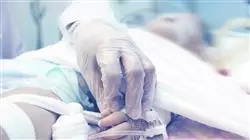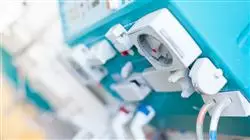University certificate
The world's largest faculty of nursing”
Introduction to the Program
It is necessary to educate nursing professionals to acquire the knowledge, skills and attitudes that will enable them to approach and manage the critically ill pediatric patient in all its dimensions"

This program is designed to enable professionals to review and approach the different techniques that allow them to identify critical patients, apply the techniques learned, as well as substitute the respiratory and circulatory functions in cases where the patient is unable to perform them by themselves or apply cardiopulmonary resuscitation techniques if necessary.
In addition, it includes the most relevant aspects about pediatric emergency department organization, the triage process of patients according to their severity, their transport, the need for CPR maneuvers, airway management, as well as all the necessary techniques (assisted ventilation, drug administration, etc.) for patient stabilization, considering their transfer to the pediatric intensive care unit if necessary.
The Postgraduate diploma in Pediatric Critical Care for Nursing is oriented to enable nursing professionals to incorporate the advances in the field, as well as to review the most important aspects of emergency care in critical pediatric patients for nursing and their care.
Maintaining and improving Pediatric Critical Care for Nursing is essential in order to improve prognosis and reduce sequels and complications"
This Postgraduate diploma in Pediatric Critical Care for Nursing contains the most complete and up-to-date scientific program on the market. The most important features include:
- Clinical cases presented by experts in the different specialties
- The graphic, schematic, and practical contents with which they are created, provide scientific and practical information on the disciplines that are essential for professional practice
- Diagnostic and therapeutic novelties on child care. It includes the most prevalent pathologies in pediatric intensive care
- Specific sections in each module on nursing techniques and procedures according to the child's age: peripheral and central venous access, drug administration routes, intraosseous puncture, capnography and pulse oximetry, rapid intubation sequence, as well as basic airway management, analgesia and sedation in children
- Video lessons on the different pathologies and their management
- An algorithm-based interactive learning system for decision-making in the clinical situations presented throughout the course
- Includes theoretical lectures, questions to the expert, discussion forums on controversial issues and individual reflection papers
- Content that is accessible from any fixed or portable device with an Internet connection
This Postgraduate diploma may be the best investment you can make in the selection of an updated program for two reasons: in addition to updating your knowledge in care for Pediatric Critical Care for Nursing , you will obtain a Postgraduate diploma by TECH"
Its teaching staff includes leading nursing professionals, who bring to their work experience to this program, as well as other professionals who specialize in the various fields of emergency care.
Thanks to its multimedia content developed with the latest educational technology, they will allow the professionals a situated and contextual learning, that is to say, a simulated environment that will provide an immersive learning programmed to prepare in real situations.
This program is designed around Problem-Based Learning, whereby nursing professionals must try to solve the different professional practice situations that arise throughout the program. This will be done with the help of an innovative interactive video system developed by renowned experts in nursing care for Pediatric Critical Care for Nursing with extensive teaching experience.
It includes clinical cases to bring the development of the program as close as possible to the reality of nursing care"

Don't miss the opportunity to update your knowledge in Pediatric Critical Care to increase the quality of care"
Why study at TECH?
TECH is the world’s largest online university. With an impressive catalog of more than 14,000 university programs available in 11 languages, it is positioned as a leader in employability, with a 99% job placement rate. In addition, it relies on an enormous faculty of more than 6,000 professors of the highest international renown.

Study at the world's largest online university and guarantee your professional success. The future starts at TECH”
The world’s best online university according to FORBES
The prestigious Forbes magazine, specialized in business and finance, has highlighted TECH as “the world's best online university” This is what they have recently stated in an article in their digital edition in which they echo the success story of this institution, “thanks to the academic offer it provides, the selection of its teaching staff, and an innovative learning method aimed at educating the professionals of the future”
A revolutionary study method, a cutting-edge faculty and a practical focus: the key to TECH's success.
The most complete study plans on the university scene
TECH offers the most complete study plans on the university scene, with syllabuses that cover fundamental concepts and, at the same time, the main scientific advances in their specific scientific areas. In addition, these programs are continuously being updated to guarantee students the academic vanguard and the most in-demand professional skills. In this way, the university's qualifications provide its graduates with a significant advantage to propel their careers to success.
TECH offers the most comprehensive and intensive study plans on the current university scene.
A world-class teaching staff
TECH's teaching staff is made up of more than 6,000 professors with the highest international recognition. Professors, researchers and top executives of multinational companies, including Isaiah Covington, performance coach of the Boston Celtics; Magda Romanska, principal investigator at Harvard MetaLAB; Ignacio Wistumba, chairman of the department of translational molecular pathology at MD Anderson Cancer Center; and D.W. Pine, creative director of TIME magazine, among others.
Internationally renowned experts, specialized in different branches of Health, Technology, Communication and Business, form part of the TECH faculty.
A unique learning method
TECH is the first university to use Relearning in all its programs. It is the best online learning methodology, accredited with international teaching quality certifications, provided by prestigious educational agencies. In addition, this disruptive educational model is complemented with the “Case Method”, thereby setting up a unique online teaching strategy. Innovative teaching resources are also implemented, including detailed videos, infographics and interactive summaries.
TECH combines Relearning and the Case Method in all its university programs to guarantee excellent theoretical and practical learning, studying whenever and wherever you want.
The world's largest online university
TECH is the world’s largest online university. We are the largest educational institution, with the best and widest online educational catalog, one hundred percent online and covering the vast majority of areas of knowledge. We offer a large selection of our own degrees and accredited online undergraduate and postgraduate degrees. In total, more than 14,000 university degrees, in eleven different languages, make us the largest educational largest in the world.
TECH has the world's most extensive catalog of academic and official programs, available in more than 11 languages.
Google Premier Partner
The American technology giant has awarded TECH the Google Google Premier Partner badge. This award, which is only available to 3% of the world's companies, highlights the efficient, flexible and tailored experience that this university provides to students. The recognition as a Google Premier Partner not only accredits the maximum rigor, performance and investment in TECH's digital infrastructures, but also places this university as one of the world's leading technology companies.
Google has positioned TECH in the top 3% of the world's most important technology companies by awarding it its Google Premier Partner badge.
The official online university of the NBA
TECH is the official online university of the NBA. Thanks to our agreement with the biggest league in basketball, we offer our students exclusive university programs, as well as a wide variety of educational resources focused on the business of the league and other areas of the sports industry. Each program is made up of a uniquely designed syllabus and features exceptional guest hosts: professionals with a distinguished sports background who will offer their expertise on the most relevant topics.
TECH has been selected by the NBA, the world's top basketball league, as its official online university.
The top-rated university by its students
Students have positioned TECH as the world's top-rated university on the main review websites, with a highest rating of 4.9 out of 5, obtained from more than 1,000 reviews. These results consolidate TECH as the benchmark university institution at an international level, reflecting the excellence and positive impact of its educational model.” reflecting the excellence and positive impact of its educational model.”
TECH is the world’s top-rated university by its students.
Leaders in employability
TECH has managed to become the leading university in employability. 99% of its students obtain jobs in the academic field they have studied, within one year of completing any of the university's programs. A similar number achieve immediate career enhancement. All this thanks to a study methodology that bases its effectiveness on the acquisition of practical skills, which are absolutely necessary for professional development.
99% of TECH graduates find a job within a year of completing their studies.
Postgraduate Diploma in Critical Pediatric Patients for Nursing
Pediatric critically ill patients are those children who have a serious illness or injury and require intensive and life-sustaining care to recover. These patients usually require specialized care by nurses trained in pediatric intensive care, and may be admitted to pediatric intensive care units (PICUs), intermediate care units (ICUs) or emergency rooms.
Pediatric critically ill patients are those who need intensive specialized medical care, and pediatric critical care nurses have a critical role in the care and treatment of these patients. Nurses must be trained and up-to-date on the care and techniques necessary to provide excellent care to these patients and their families. As primary care providers, critical pediatric nurses have a vital responsibility in the care and treatment of these patients. Within their daily duties, critical pediatric nurses may be required to administer medications, monitor vital signs and body functions, perform invasive procedures (such as catheter or nasogastric tube placement), and establish infection prevention measures and basic hygiene care.
In addition, critical pediatric nurses often interact with patients' families, providing them with information about their children's condition, explaining treatments and monitoring their response to treatment. Nurses may also work in an interdisciplinary manner with other healthcare professionals, such as physicians, occupational therapists, physical therapists and social workers, to provide comprehensive patient care.
The goal of this online academic program is to provide nursing students with specialized training in the care of critically ill pediatric patients. Upon completion of this program, students will gain advanced knowledge and specialized skills in the assessment and care of critically ill pediatric patients, which will make them more effective and compassionate in their daily work. It will also provide specialized training in the care of critically ill pediatric patients.







